
Under current alcohol laws, most chain grocery stores can sell beer, but not wine. This proposal would allow supermarkets to sell wine starting from March 1, 2023.
If it passes, this ballot measure will follow on the heels of recent changes enacted in the legislature that allowed grocery and convenience stores to start selling full-strength beer three years ago.
This is the second time wine in grocery stores has been on the ballot. In 1982 voters rejected the measure 65 to 35 percent.
Thirty-nine other states allow wine to be sold in supermarkets and backers argue that, especially as more people have moved to Colorado from out of state, they increasingly expect to see wine for sale at the grocery store.
Supporters and opponents of the measure dispute what its effect could be on Colorado’s independently-owned liquor stores. The Colorado Licensed Beverage Association has said that up to half of the state’s liquor stores could go out of business if Prop 125 passes. But, supporters of the initiative argue similarly pessimistic predictions about the impact of allowing supermarkets to sell full-strength beer have not come to pass.
Here’s the language you’ll see on the ballot:
Shall there be a change to the Colorado Revised Statutes concerning the expansion of retail sale of alcohol beverages, and, in connection therewith, establishing a new fermented malt beverage and wine retailer license for off-site consumption to allow grocery stores, convenience stores, and other business establishments licensed to sell fermented malt beverages, such as beer, for off-site consumption to also sell wine; automatically converting such a fermented malt beverage retailer license to the new license; and allowing fermented malt beverage and wine retailer licensees to conduct tastings if approved by the local licensing authority?
How would it work?
Because it’s a law change, this measure needs a simple majority (anything over 50 percent) to pass.
If voters approve Prop 125, supermarkets would be allowed to sell wine just like they currently sell beer. This would not require any new licensing, but would instead expand the store’s existing license to cover wine starting March 1, 2023. Most chain supermarkets would still be barred from selling hard alcohol.
Who’s for it?
Supermarket chains and tech companies are the main proponents of this measure. According to them, it would be more convenient for customers.
“Coloradans want convenience. They want choice.” said Sheila MacDonald, a representative of the Wine in Grocery Stores issue committee. “They want Starbucks, a deli, a Covid-booster shot, organic produce and a specialty cheese section at the grocery store, along with beer and wine.”
Wine in Grocery Stores has raised over 11 million dollars since its creation in June. The vast majority of that money has come from six large national companies. DoorDash and Instacart have both contributed over 3 million dollars, and the other four — Krogers, Safeway, Target and Whole Foods — have chipped in at least 1 million a piece.
Who’s against it?
The state has about 1,600 liquor stores. Many of these are small, locally owned and independently operated. Half of them are woman owned and almost two thirds of owners use English as a second language.
These smaller liquor stores oppose wine in supermarkets. They stand to lose a significant portion of their wine business to grocery stores, impacting their bottom line.
Many liquor store owners also say that allowing wine in supermarkets will lead to fewer choices for customers. Their argument is that grocers are only able to dedicate a small portion of their shelf space to wine and only sell the most popular brands.
“They've got, I don't know, 50,000 items to keep track of. There's no way they can help you,” said Carolyn Joy, owner of Joy Wine and Spirits in Denver.
Keeping Colorado Local, an issue committee formed to oppose the ballot measure, has raised over $450,000 dollars.
Further coverage
- Family-owned liquor stores face uncertain future as voters could decide key changes at the ballot
- Wine at your grocery store? Doordash and big supermarket chains want you to vote on it this fall








